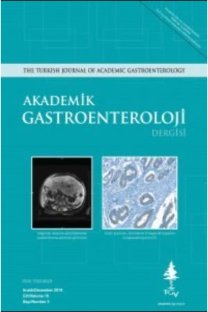İnsülin direncinin akut pankreatit şiddetine etkisi
İnsülin direnci, HOMA-IR, BISAP, Balthazar, akut pankreatit
Effect of insulin resistance on the severity of acute pancreatitis
Insulin resistance, HOMA-IR, BISAP, Balthazar, acute pancreatitis,
___
- 1. Peery AF, Dellon ES, Lund J, et al. Burden of gastrointestinal disease in the United States : 2012 Update. Gastroenterology 2012;143:1179-87.e3.
- 2. Toouli J, Brooke-Smith M, Bassi C, et al; Working Party of the Program Commitee of the Bangkok World Congress of Gastroenterology 2002. Guidelines for the management of acute pancreatitis. J Gastroenterol Hepatol 2002;17(Suppl):S15-39.
- 3. Gloor B, Mu CA, Worni M, et al. Late mortality in patients with severe acute pancreatitis. Br J Surg 2001;88:975-9.
- 4. Singh VK, Bollen TL, Wu BU, et al. An assessment of the severity of interstitial pancreatitis. Clin Gastroenterol Hepatol 2011;9:1098-103.
- 5. Kahaleh M, Freeman M. Prevention and management of post-endoscopic retrograde cholangiopancreatography complications. Clin Endosc 2012;45:305-12.
- 6. Huh JH, Jeon H, Park M, et al. Diabetes mellitus is associated with mortality in acute pancreatitis. J Clin Gastroenterol 2018;52:178-83.
- 7. Krishna SG, Hinton A, Oza V, et al. Morbid obesity is associated with adverse clinical outcomes in acute pancreatitis: A propensity-matched study. Am J Gastroenterol 2015;110:1608-19.
- 8. Huh JH, Kim JW, Lee KJ. Vitamin D deficiency predicts severe acute pancreatitis. United Eur Gastroenterol J 2019;7:90-5.
- 9. Haas JT, Biddinger SB. Dissecting the role of insulin resistance in the metabolic syndrome. Curr Opin Lipidol 2009;20:206-10.
- 10. Bollen TL. Acute pancreatitis: international classification and nomenclature. Clin Radiol 2016;71:121-33.
- 11. Lankisch PG, Apte M, Banks PA. Acute pancreatitis. Lancet 2015;386:85-96.
- 12. Altunoglu EG. Insulin resistance. Istanbul Med J 2012;13:137-40.
- 13. Mikó A, Farkas N, Garami A, et al. Preexisting diabetes elevates risk of local and systemic complications in acute pancreatitis: Systematic review and meta-analysis. Pancreas 2018;47:917-23.
- 14. Lee YH, Pratley RE. The evolving role of inflammation in obesity and the metabolic syndrome. Curr Diab Rep 2005;5:70-5.
- 15. Yalniz M, Toksoy R, Demirel U, et al. Insulin resistance and adipocytokine levels in patients with acute pancreatitis. The Turkish Journal of Academic Gastroenterology 2012;11:103-9.
- 16. Cho SK, Huh JH, Yoo JS, et al. HOMA-estimated insulin resistance as an independent prognostic factor in patients with acute pancreatitis. Sci Rep 2019;9:14894.
- 17. Koksal AR, Boga S, Alkim H, et al. Insulin resistance as a novel risk factor for post-ERCP pancreatitis: A Pilot Study. Dig Dis Sci 2016;61:2397-405.
- 18. Tenner S, Sica G, Hughes M, et al. Relationship of necrosis to organ failure in severe acute pancreatitis. Gastroenterology 1997;113:899-903.
- 19. Papachristou GI, Muddana V, Yadav D, et al. Comparison of BISAP, Ranson's, APACHE-II, and CTSI scores in predicting organ failure, complications, and mortality in acute pancreatitis. Am J Gastroenterol 2010;105:435-41; quiz 442.
- ISSN: 1303-6629
- Yayın Aralığı: Yılda 3 Sayı
- Başlangıç: 2002
- Yayıncı: Jülide Gülay Özler
Nurten TÜRKEL KÜÇÜKMETİN, Tevfik SOLAKOĞLU
Pankreatik psödokistlerde tanısal yöntemlerin performansı
Yavuz ÖZDEN, Göksel BENGİ, Funda BARLIK OBUZ, Canan ALTAY, Özgül SAĞOL, Anıl AYSAL AĞALAR, Tarkan ÜNEK, Müjde SOYTÜRK
Emre GERÇEKER, Serkan CERRAH, Ahmet Ramiz BAYKAN, Hakan YÜCEYAR
Whipple hastalığı ve multiple myelom birlikteliği: nadir bir olgu sunumu
Azar ABIYEV, Harun KÜÇÜK, Beyza Hilal KINDAN, Kübra ÇALIŞKAN GÜNEŞ, Ayşe DURSUN, İbrahim DOĞAN, Tarkan KARAKAN
Derya ARI, Dilara TURAN GÖKÇE, Hale GÖKCAN, Ömer ÖZTÜRK, Ferhat BACAKSIZ, Sabite KACAR, Meral AKDOĞAN KAYHAN
İnsülin direncinin akut pankreatit şiddetine etkisi
Ezgi KARAHAN, Zeynep GÖK SARGIN, Yücel ÜSTÜNDAĞ
Hepatosellüler kanserin humerus metastazı: Nadir bir olgu sunumu
Şehmus ÖLMEZ, Bünyamin SARITAŞ, Özgür KÜLAHÇI, Gökhan SÖKER, Osman ÇİLOĞLU
